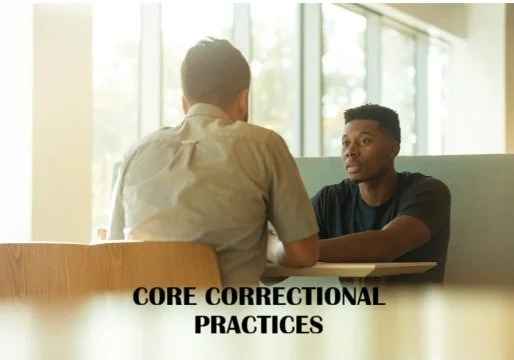 Image 1 of 1
Image 1 of 1


Core Correctional Practices
STC# PENDING
In the 1980s, Andrews and Keissling introduced Core Correctional Practices, commonly referred to as CCPs, as a way to increase the therapeutic potential of rehabilitation. Core Correctional Practices are approaches staff should utilize with participants. Research shows, if implemented properly, Core Correctional Practices can reduce recidivism by teaching participants how to engage in long-term prosocial behavior. This class is developed to instruct staff on these skills and their support of cognitive- behavioral programming. CCPs are relevant to direct care, security staff, and treatment staff. Specific topics addresses in training include: the principles of effective intervention, core correctional practices (relationships skills, effective use of reinforcement, effective use of disapproval, effective use of authority, prosocial modeling, cognitive restructuring, social skills training and problem-solving skills, principles of effective behavior management system, and implementation of CCP. Coaches and Trainers protocols have been developed to support both staff and agency sustainability of proficiency, quality, and ongoing implementation.
16 Hours/2 Day 20 Student Max
STC# PENDING
In the 1980s, Andrews and Keissling introduced Core Correctional Practices, commonly referred to as CCPs, as a way to increase the therapeutic potential of rehabilitation. Core Correctional Practices are approaches staff should utilize with participants. Research shows, if implemented properly, Core Correctional Practices can reduce recidivism by teaching participants how to engage in long-term prosocial behavior. This class is developed to instruct staff on these skills and their support of cognitive- behavioral programming. CCPs are relevant to direct care, security staff, and treatment staff. Specific topics addresses in training include: the principles of effective intervention, core correctional practices (relationships skills, effective use of reinforcement, effective use of disapproval, effective use of authority, prosocial modeling, cognitive restructuring, social skills training and problem-solving skills, principles of effective behavior management system, and implementation of CCP. Coaches and Trainers protocols have been developed to support both staff and agency sustainability of proficiency, quality, and ongoing implementation.
16 Hours/2 Day 20 Student Max
